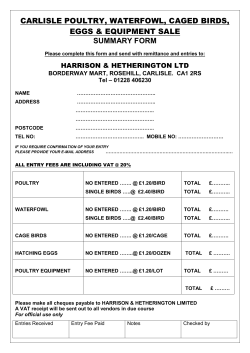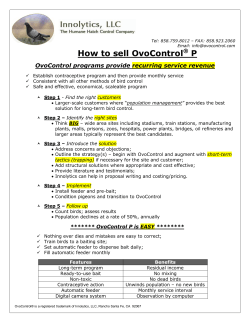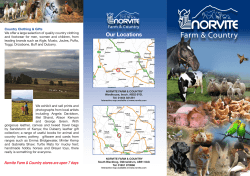
Bird flu - Biosecurity and Prevention
KY EDEN-JSK.313 Bird Flu – Biosecurity & Prevention Avian influenza, or bird flu, is a virus that causes disease in chickens, turkeys, pheasants, quail, ducks, geese, as well as other birds. Proper biosecurity measures can help keep flocks healthy and prevent bird flu and other diseases. Remember the management practices that will help keep your flock disease-free by using the acronym FLU STOP. Flock observation. Early detection is very important to stop the spread of disease. Observe flocks daily. Note changes in appearance, behavior, and drinking and eating habits. Poultry infected with bird flu may show one or more signs of eating less, coughing, sneezing, nasal discharge, differences in egg production, lack of energy, swelling, purple discoloration, lack of coordination, diarrhea, depression, muscle tremors, drooping wings, twisting of head and neck, inability to move, or sudden death. Watch for increased number of deaths. Collect dead birds frequently. Dispose of dead birds properly by incineration, composting, or burial. If only a few birds need to be disposed, double bag the birds, sealing both bags, and place in the trash. Limit traffic. Contaminated clothing and equipment can spread avian influenza between poultry premises. Allow only the necessary workers and vehicles to enter the farm. Post warning signs and lock buildings. Have visitors sign a log book when they enter and leave the farm and don’t be afraid to ask where they’ve been. Be aware of places where visitors may have been in contact with birds or their feces (hunting, farm ponds, pet stores, zoos, parks, etc.) They could accidentally bring disease onto the farm. At the minimum, have visitors and workers put on clean boots to help stop the spread of disease. Humans may catch bird flu through having extensive contact with infected birds. When working in places that are or could be infected with bird flu, poultry workers should wear personal protective equipment such as boots, coveralls, gloves, face masks, and headgear. Unwanted critters. The avian influenza virus can be spread through the feces and bodily fluids of infected birds. Keep poultry from coming into direct contact with wild birds. Prevent flocks from using feed and water sources which may be contaminated with feces of wild birds. Clean up spilled grain and feed to control wild birds and rodents. Keep grass around pens and buildings mowed. Do not allow dogs, cats, or any other animals into the poultry house. Prevent contact between pigs and birds. Even if infected, pigs may not display symptoms of bird flu and can spread the disease to poultry. A chicken is the only animal that should be in a chicken house. When returning from a show or swap meet, it is best not to bring back unsold birds to the farm. If you must bring birds back to the farm, or are bringing new birds to the flock, isolate new poultry from resident birds for at least 30 days. Anthony Pescatore, Poultry Specialist; Jacqueline Jacob, Extension Associate; Andrea Higdon, Emergency Management System Director. March 2015. Information contained in this document is accurate as of the date of the last update. Document last updated on: March 19, 2015. Educational programs of Kentucky Cooperative Extension serve all people regardless of race, color, age, sex, religion, disability, or national origin. Sanitation. Keep pens and buildings neat and clean. Prevent wet or damp litter and get rid of standing water in pens. If attending a poultry show or swap meet, or delivering birds to another farm, clean and disinfect all equipment and crates before returning to the farm. Use plastic crates as they are easier to clean than wooden crates. Thoroughly clean and disinfect vehicles (including the tires, undercarriage, and floorboards) when entering and leaving the farm. Establish a wash area away from poultry buildings and keep a log of equipment that travels from one property to another. Wash and disinfect any shared equipment. Provide designated clean clothing and disinfection facilities for employees. Talk to vet. Early detection and reporting are the most important steps in stopping a disease outbreak. Those who notice unusual symptoms or significant death loss in their flock should contact their local veterinarian, the Kentucky Office of State Veterinarian at (502) 7825920 or USDA Veterinary Services at (866) 536-7593. To report sick or dead wild birds, call the U.S. Department of Fish and Wildlife at (866) 4USDAWS or the Kentucky Department of Fish and Wildlife at (800) 858-1549. Because waterfowl pose the greatest risk, call to report any number of sick or dead waterfowl. For any other type of wild bird, only call to report if the incident involves 5 or more birds. Objects spread disease. Bird flu can be spread from one farm to another through direct contact with an infected bird. It can also be spread by manure, equipment, vehicles, egg flats, eggshells, crates, clothing, and boots. Avoid visiting other poultry farms. After visiting another farm or live-bird market, change footwear and clothing before working with your own flock. Don’t share feeders, waterers, crates, equipment, vehicles, or gardening tools with other farms. Wash and disinfect any shared equipment. After collecting the eggs, rub with dry sandpaper to remove feces which may be on the outer surface of the shell, or the eggs may be washed with water that is 110° to 120° F. The eggs should be at room temperature before washing. Do not reuse egg cartons, egg flats, or packing material. Prepare food properly. Avian influenza is not passed through properly cooked and prepared food. When following standard hygienic practices and proper cooking methods, poultry and poultry products can be prepared and eaten as usual. Do not eat, drink, or use tobacco products when handling poultry. Wash hands and surfaces with hot soapy water before and after handling raw poultry or eggs. Keep raw poultry and their juices away from other foods. Sanitize cutting boards by using a solution of 1 teaspoon of chlorine bleach in 1 quart of water. Cook poultry to at least 165◦F. Check the temperature with a meat thermometer in the thickest parts of the breast and thigh. The juice in properly cooked chicken will run clear. Serve cooked poultry on a clean plate. Eggs are safe to eat when the whites and yolks are firm. Page 2 of 2
© Copyright 2025
















